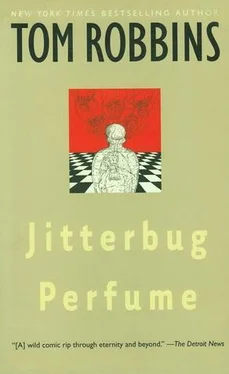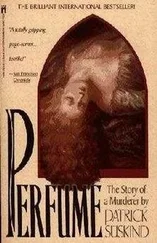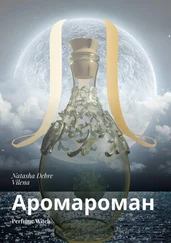The shaman sipped ritualistically. Alobar told his whole story. When only the dregs were left of the one's tea and the other's tale, the shaman took several short pieces of string from his pocket and began to knot them together, mumbling all the while. “In my net,” he mumbled, “I bind the sobs of the dark ice cracking. In my net I bind the ax's response to the pinecone. I bind the larva's curved belly. I bind the hole in the sky where the comets escape. I bind the roots of the rainbow and the flight of the alder.” He went on and on in that manner—"My net binds the hornet's deaf grandmother" — until Alobar was ready to grab him and give him another shaking.
Just as Alobar reached the end of his patience, the shaman unclasped his hands, revealing the pieces of string, which in the knotting, had turned into a delicate violet, its petals the color of love bites on a collarbone. Alobar reached for the flower, but it burst into flame and was consumed in the shaman's fingers without burning them. It was Alobar's turn to mumble. “In the future I shall be more careful about whose door I knock down,” he said, mopping up with his sleeve the tea he had spilled in his astonishment.
The shaman laughed. “Don't pay any attention to that old magic,” he said. “It used to be powerful, but now it is only the pastime of a few crazy old farts who remember how to talk with weeds.” Alobar sought to protest, but the shaman interrupted. “Man is turning away from the plants and animals,” he said. “Slowly he is breaking his bond with them. Someday he will have to reestablish contact, if the universe is to survive. For now, however, it is probably best that he set out on his own in his new direction.”
“How so?”
“A salamander can be only a salamander, an elk an elk, and a bush a bush. True, a bush is complete in its bushness, yet its limits, while not nearly so severe as some foolish men would believe, are fairly obvious. The peasants of Aelfric are like bushes, like salamanders. They were born one thing and will die one thing. But you. . you have already been a warrior, a king, and a serf, and from the looks of it, you aren't through yet. Thus, you have learned the secret of the new direction. That is: a man can be many things. Maybe anything .
“In the past, there was little separation between the lives of plants and animals and the lives of men. Nowadays, there are men who practice separation, not only from the creatures but from other men. The Romans with their Christianity have promoted the idea of the human individual. But you are neither Roman nor Christian, and you are no less smitten, so perhaps the spirit is in the air. The Romans encourage individualism, but they maintain rigid controls. Sooner or later, men will come along whose belief in the supremacy of the exceptional, extraordinary, isolated individual will cause them to declare themselves exempt from controls. In their uniqueness, they will not hesitate to defy accepted standards. Oh, these men will give Rome — and the Romes that shall follow Rome — a very large headache. You, Alobar, I suspect, are among the first of such men.
“No, no, do not object. I can tell that my words both delight and excite you.”
It was true. And in his delightment and excitement, Alobar had let his tea grow cold, so the shaman warmed his cup.
“Were you an ordinary peasant, I would dazzle you with another trick or two; I'd berate you and comfort you and send you back to Aelfric to face your death without alarm. Most of the peasants are content to die. For them, death means the cessation of toil. At last they can drop their soiled and battered bodies and enter the dimension of pure spirit. Plants and animals are even more comfortable with death. It is the natural end. But man by his nature is an unnatural animal. If any creature stands a chance of defeating death, it is man.
“If you were an ordinary serf, I would send you back to Aelfricto assist your neighbors in the public purification they undergo at the end of the old year and the beginning of the new, to help them mock the things they love best in order that they might revere them the more. I'd send you back to wear the sacred mistletoe, to be King of the Bean, to be sacrificed to the good old goddess of agriculture. Instead, I encourage you to ride this strange wind that is blowing through you; to ride it to wherever it will carry you.”
“But which way shall I go?”
“That is between you and the wind. You seem to be searching for a kind of immortality. With that I cannot help you. In the realms that I inhabit, death is a companion. One does not quarrel with one's friend. If you desire to meet masters with power over death, I suggest you travel to the distant east.”
“As far as Hellas?”
“Far, far beyond Hellas.”
“To Egypt, then?” In Alobar's mind, Egypt, with its confounding mirrors, was the end of the trolley line.
“As far as Egypt is, you must go three times that far.”
“Three times farther than Egypt? Are you trying to trick me? I would fall over the edge of the earth!”
The shaman snorted with laughter. “Alobar. The earth does not have an edge.”
It was Alobar's turn to laugh. He thought he might be in the company of a crazy old fart, after all. “What utter nonsense,” he declared.
“You are a free and special man, Alobar. Therefore I'm going to let you in on a little secret. Listen. I converse regularly with the birds and the fish. And the birds and the fish have assured me many times that there isn't any edge. We live on a ball, Alobar. We do. Keep this quiet: the world is round.”
So heady was the idea that Alobar felt faint. He gulped his tea and gazed into the shaman's eyes — eyes as shiny and black as the bean in the cake — to ascertain that he was not being joshed. When he was convinced of the shaman's sincerity, he stood and gathered his hides about him. “I suppose I should be off then.”
“I suppose you should.”
“I surmise that several Feasts of Feasts will be consumed ere I am returned. However, I should be pleased to build you a strong new door when next I pass this way.”
“You plan to return, then?”
“If the world be round, I can scarcely help it.” He chuckled. “Someday, I should like to mingle with my clan again, even if I must disguise myself to do so.”
The shaman shook his head. “I have it on good authority that Lord Aelfric's men are going to attack your old citadel as soon as the roads are dry in spring. They will kill all who resist and baptize the remainder. Long before you return — if you return — the independent city you once ruled will be but another Roman outpost on the frontiers of the Holy Empire.”
Alobar smacked his palm with his fist. “Then I must warn the clan! I'll organize a defense! Maybe we'll attack first! By the golden whiskers of the morning star, we'll show those turnip eaters what battle's about! They'll need more than one god to save their asses ere I and my boys are through, blah blah blah. .”
“Too late, Alobar, too late.” As if to somehow illustrate his point, the shaman tore a badger mask from the wall and tossed it into the fire. “The foe is not merely Lord Aelfric but the whole of the empire. It is too large, too entrenched, has too much momentum. The world is changing, Alobar.” He gestured at the burning mask. “Don't waste your life trying to hold back the tides of history. History begot Rome, and history someday will bury it. In the meantime, you've other fish to fry. Have you forgotten? Are you to be an individual, a trespasser in territory none else has had the wit or nerve to explore, or just another troublesome mosquito to be swatted by the authorities? You're no longer king or warrior, remember, but something new. It will do your clansmen no good for you to be slain alongside them, but who can guess what benefits may result from a new life wholly led?”
Читать дальше












